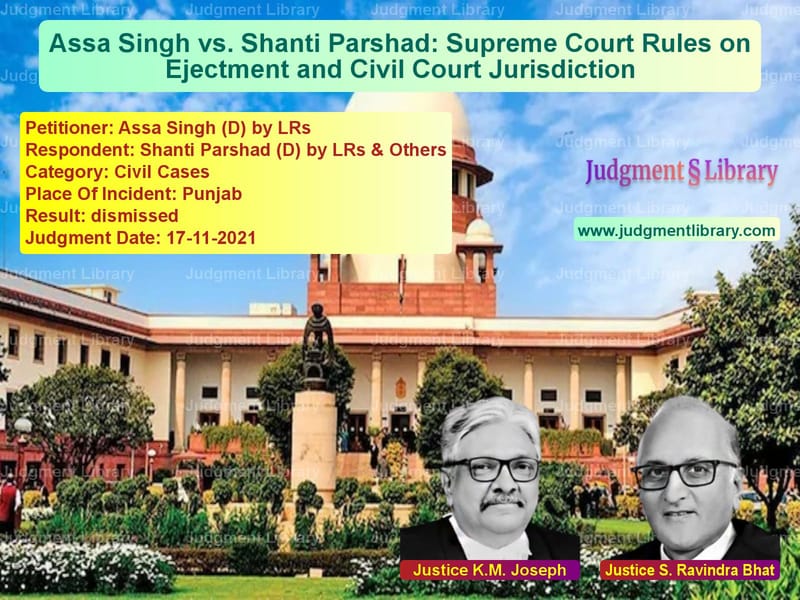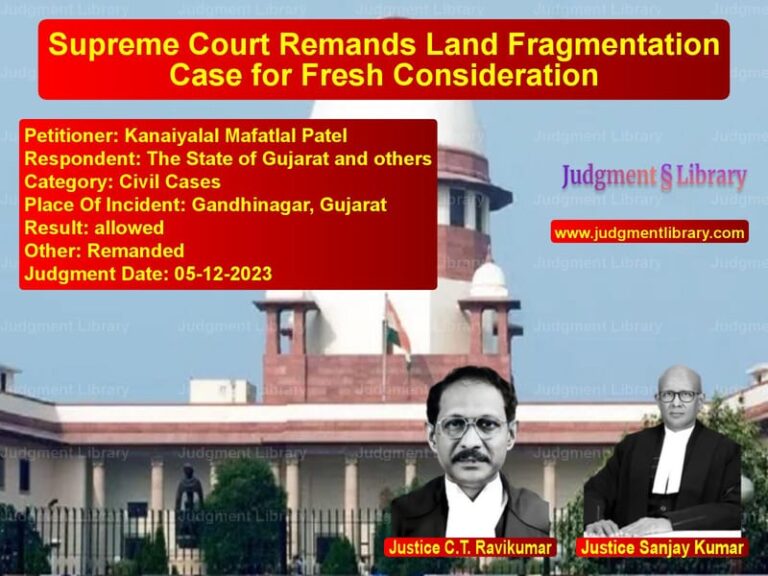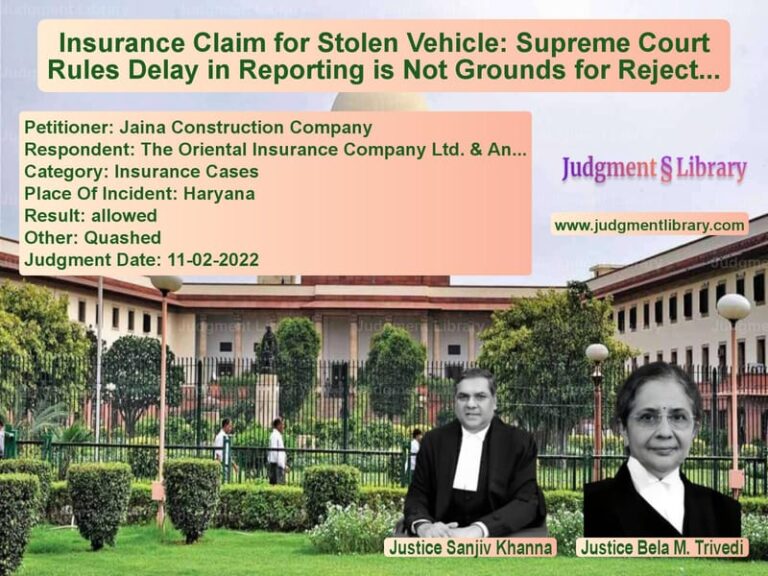Assa Singh vs. Shanti Parshad: Supreme Court Rules on Ejectment and Civil Court Jurisdiction
The case of Assa Singh (D) by LRs vs. Shanti Parshad (D) by LRs & Others revolves around a long-standing legal dispute concerning the ejectment of a tenant and the jurisdiction of Civil Courts in matters governed by the Punjab Security of Land Tenures Act, 1953. The Supreme Court examined whether the civil suit filed by the respondent was barred under Section 25 of the Act, which excludes the jurisdiction of civil courts in certain matters.
Background of the Case
The appellants filed an application for ejectment of the first respondent under the Punjab Security of Land Tenures Act, 1953, on the ground of non-payment of rent. The Assistant Collector, Ferozepur, allowed the application in 1972. The first respondent’s appeal before the Collector was dismissed, as was his revision before the Commissioner. However, the Commissioner referred the matter to the Financial Commissioner, Punjab, suggesting that the parties seek relief in Civil Court. The Financial Commissioner dismissed the first respondent’s revision petition.
Following these decisions, the first respondent instituted a civil suit claiming that the land in question belonged to Mandir Jhoke Hari Har (a religious endowment), that the appellants had no ownership over it, and that the eviction order passed by the Assistant Collector was null and void.
Arguments by the Appellants (Assa Singh & Others)
- The appellants argued that the civil suit was barred under Section 25 of the Punjab Security of Land Tenures Act, which states:
“Except in accordance with the provisions of this Act, the validity of any proceedings or order taken or made under this Act shall not be called in question in any court or before any other authority.”
- They contended that the Assistant Collector’s order was final and that the respondent could not challenge it in a civil suit.
- They also maintained that they had legally purchased the land from Mahant Ramji Dass and that the first respondent was their tenant.
Arguments by the Respondents (Shanti Parshad & Others)
- The respondents argued that the land belonged to Mandir Jhoke Hari Har, and that the appellants had no legal authority over it.
- They contended that Mahant Ramji Dass had no ownership rights and therefore could not have legally sold the land to the appellants.
- They further asserted that there was no landlord-tenant relationship between them and the appellants, making the eviction order void.
Supreme Court’s Observations
The Supreme Court, in its judgment delivered by K.M. Joseph and S. Ravindra Bhat, analyzed the issue of whether the civil suit was barred under Section 25 of the Punjab Security of Land Tenures Act.
The Court noted:
“The validity of an order made under this Act cannot be questioned except in accordance with the provisions of the Act. However, where the very existence of the landlord-tenant relationship is disputed, the jurisdiction of the civil court is not ousted.”
The Court further observed:
“If the Revenue Court proceeds to decide an eviction matter without first establishing the landlord-tenant relationship, its order can be challenged in a civil suit.”
The Supreme Court ruled that:
- The eviction order was based on the assumption that the appellants were the legal landlords, which was contested by the respondents.
- The civil suit was maintainable because it raised a fundamental question about the ownership of the land and the validity of the landlord-tenant relationship.
- The High Court was correct in dismissing the appellants’ claim.
Key Takeaways from the Judgment
- Jurisdiction of Civil Courts: Even when a statute bars the jurisdiction of civil courts, they can still intervene in cases where fundamental rights, such as ownership and title, are disputed.
- Determination of Landlord-Tenant Relationship: The ruling reinforces that eviction proceedings cannot proceed without first establishing the existence of a landlord-tenant relationship.
- Protection of Religious Endowments: The case highlights the importance of protecting properties belonging to religious institutions from unauthorized sales.
Conclusion
The Supreme Court’s ruling in Assa Singh vs. Shanti Parshad reinforces the principle that statutory bars on civil jurisdiction do not apply when fundamental questions of ownership and landlord-tenant relationships are in dispute. The judgment upholds the rights of religious institutions and prevents unauthorized transfers of such properties. It also serves as a reminder that eviction proceedings must be based on legally valid relationships between landlords and tenants.
Petitioner Name: Assa Singh (D) by LRs.Respondent Name: Shanti Parshad (D) by LRs & Others.Judgment By: Justice K.M. Joseph, Justice S. Ravindra Bhat.Place Of Incident: Punjab.Judgment Date: 17-11-2021.
Don’t miss out on the full details! Download the complete judgment in PDF format below and gain valuable insights instantly!
Download Judgment: assa-singh-(d)-by-lr-vs-shanti-parshad-(d)-b-supreme-court-of-india-judgment-dated-17-11-2021.pdf
Directly Download Judgment: Directly download this Judgment
See all petitions in Property Disputes
See all petitions in Landlord-Tenant Disputes
See all petitions in Succession and Wills
See all petitions in Judgment by K.M. Joseph
See all petitions in Judgment by S Ravindra Bhat
See all petitions in dismissed
See all petitions in supreme court of India judgments November 2021
See all petitions in 2021 judgments
See all posts in Civil Cases Category
See all allowed petitions in Civil Cases Category
See all Dismissed petitions in Civil Cases Category
See all partially allowed petitions in Civil Cases Category







